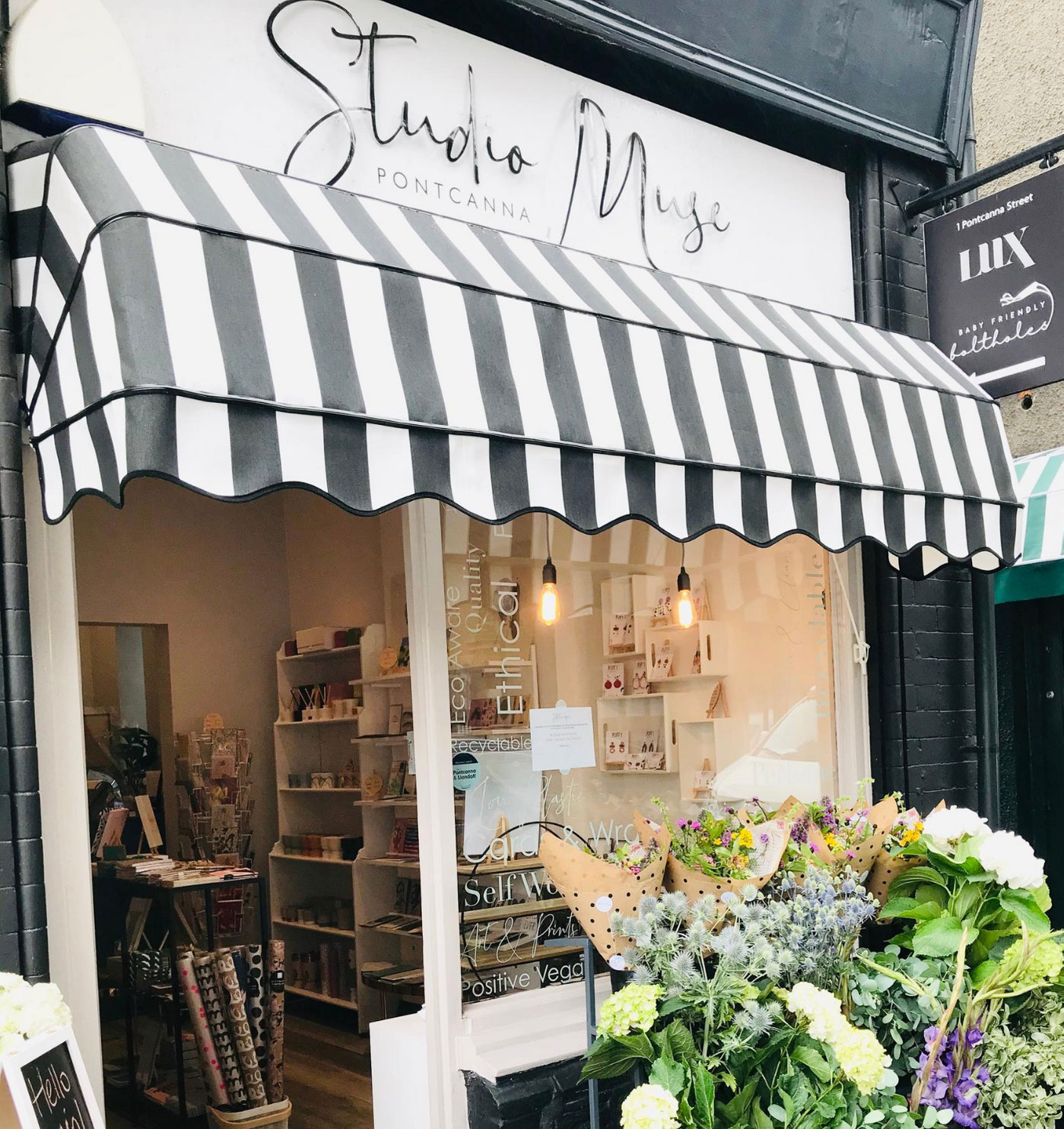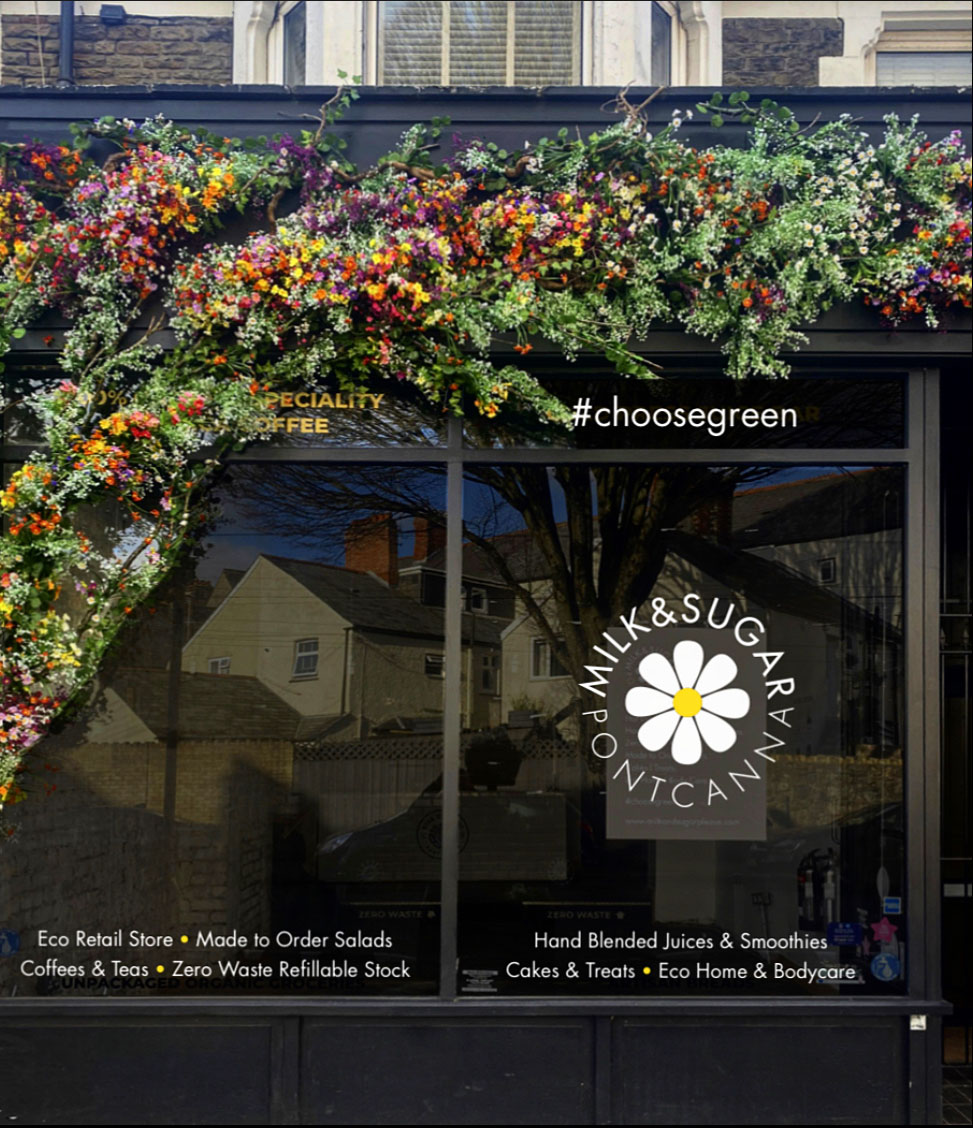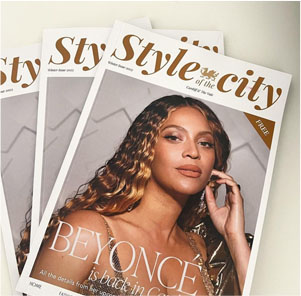Picture credit: hellogiggles.com
Sustainability is hazed with a taint of luxury that seems quite unattainable at first glance. However, once you realise sustainability is all about perception; being green on a budget can be easy.
We spoke to ten thriving Welsh businesses about how they’re doing their part for the planet whilst remaining kind to the pockets of their community. Let’s dive in, shall we?
1. Studio Muse teaches us to think of the longevity and flexibility of a product
Studio Muse, renowned in Cardiff for its luxurious products and blooming spectacular floral displays, was founded by Amy in 2019. Having been in the industry for 20 years owning salons and stores alike, Amy has found her home in her Pontcanna store that offers purely vegan and local British products.
From bespoke face creams to hand-made candles, Amy has always sought to endorse kind products. “Being vegan helps put a big rubber stamp on the fact my products are not just ethically tested but all of the ingredients are British and natural,” Amy said.
Studio Muse urges consumers to think about the long-lasting future of a product and how they can make the most of it. “I love showing a customer how they can get the best use out of a product,” Amy said before advising fellow businesses that “advice is so much better than trying to sell someone 10 different creams that catapults them into spending far too much money.”
Studio Muse teaches us that once we take on a more analytical approach to the life of products, they instantly become more affordable — even if they are made from high-quality, natural ingredients. “Being sustainable on a budget is all about choosing to not discard an item before it is used up, and then giving it another lease of life,” Amy said.
“If customers can start being willing to have less product that is ethical and better quality, that is key to a sustainable future,” Amy finished.
2. Blossom and Nectar asks us to think of how we can give back to nature
Placed at the bottom of a tarmacked road surrounded by plastic grass gardens is Blossom and Nectar. Everything from hand-made soaps, candles and gin to sourced ceramics gather in the honey-infused store of ethical beekeeper Tams.
From recyclable glass and seed-paper labels to non-toxic, chemical-free ingredients; Tams is dedicated to reducing her carbon footprint. “I can’t say I am at one with nature whilst creating stuff that gets washed down drains and kills the creatures that live in the water; or packaging that stays in the earth for years whilst giving out horrible gases,” Tams said.
Tams proves there is always more that can be done as a sustainable business, including eco-friendly packaging, recycled displays and refill stations. “We can’t keep being a disposable community,” she urged.
Tams has recently switched to labels made of degradable tree pulp. “It seems such a shame to use a material that will sit in a landfill forever and ruin the natural habitat of the animal that helps you create your product,” Tams voices.
Tams has one golden piece of advice for those becoming more sustainable on a budget. “80% of products are made by women on four pounds an hour,” she began before urging customers to not be blinded by a cheaper alternative.
With a grandmother who ran weaving looms and a grandfather who was a carpenter, Tams is also passionate about nurturing the re-growth of craft-based skills that will allow us to stray from our dependence on big businesses.
3. Fleur Studio teaches us to think of the necessity of our purchases and evaluate
It is not often that a lovely set of nails can spark a whole conversation on feminism and sustainability, but for Poppy and her team at Fleur Studio, this is the norm.
Just like their desired abstract art, Fleur Studio is changing its environmental impact in a series of shapes. Alongside using recyclable Method cleaning products and cruelty-free, vegan nail products, Fleur Studio is completely online from bookings to payments – allowing them to be a paperless business.
Fleur Studio proves that although sustainability can be incorporated into any business, the industry itself is not capable of being 100% zero-waste. Hairdressers are becoming increasingly eco-friendly with the innovation of recyclable foils and hair products, and this is a development Poppy would love to see enter the nail industry.
Beauty is both a form of self-expression and an indulgence, but Fleur Studio doesn’t want to pressure anyone into coming back sooner than they need to. “We would rather they get their full money’s worth,” Why not when Poppy prioritises learning adequate preparation of the nail that will ensure longevity.
Poppy urges everyone to keep note of how much they use a product to better understand why you want to re-purchase it. One day, you will be able to make a comfortable purchase knowing it is right for you and the environment. “Once people begin getting into this habit, they are more likely to think, ‘actually, it does make me feel great that I haven’t created so much waste’.” Poppy said.
4. Fussy Home says ‘go vintage!’
Fussy specialises in pre-loved homeware and fashion that Yvette hand-picks herself. “Buying second hand and vintage is a great way to shop sustainably on a budget,” Yvette said as she sat in her brimming treasure trove of a shop, based in the carriage of a retired Gatwick express train – of all things!
At Fussy, you’ll never know what you’ll find, “but you’ll leave with a one-off piece you can wear with sustainable pride!” Yvette sang. Yvette believes that buying vintage is a far more socially responsible way to shop as there’s no waste or mass production.
Vintage fashion is a pioneer for sustainability, but Yvette doesn’t stop there. “I’m proud to use 100% compostable and biodegradable plant-based mail bags along with recycled cardboard boxes,” Yvette said before adding, “Making use of what is already available can make a huge difference.”
Once, it would have been easy to stick ‘vintage’ on an item and be done with it. Today, with issues of greenwashing and true transparency crisis’ within the industry, it isn’t quite as easy nor ethical. “Being transparent with your practices can raise awareness to like-minded customers,” Yvette urged.
The market for vintage shopping is becoming increasingly popular as people care more about the planet now than ever and want to create a unique and individual style. Yvette urges people to not buy into trends and fads and take the time to shop around whilst investing in good quality items that you won’t want to throw away.
5. Milk and Sugar tells businesses to take the lead for their community
Milk and Sugar is the ultimate space of sustainable solace for those who want to surround themselves with conscious comrades while they work and eat. Milk and Sugar aren’t at all new to the game, having already taken over Central Square and Eastern Business Park, and now, eco-friendly hub Pontcanna.
At the very heart of Milk and Sugar is a team that proves it is possible to be sustainable whilst leading hectic lives. How? “As a business, we must buy the right things so that customers don’t have to spend as much time worrying about the choices they make,” Tim began before adding, “We want to make the right choice for them and the planet.” Tim’s mission is to introduce sustainable, eco-friendly, zero waste and refillable products to the residents and locals of Pontcanna and Canton.
Tim and his team recently made the choice to exclude almond milk as it’s bad for bees – selling soy and oat which they don’t charge extra for. “By not charging extra, the move to alternatives is easier,” Tim said.
“If a business incorporates sustainable practices into their day-to-day operations, they set a standard that consumers notice and adopt,” Tim said, before noting this advice is useful for consumers too. As well as adopting the practices of bigger companies, don’t be afraid to shop around instead of wasting money on impulse buys you don’t need. “That’s one thing I’m still working on,” Tim said.
6. Hand Painted Biscuit Company asks, ‘Is there a more sustainable way to do this?’
From Buffy the Vampire Slayer to sweet Little Women designs, Hand Painted biscuit Company’s made-to-order designs travel all over the UK before ending up in the homes of those with a dairy free sweet tooth.
What has gone into founder Emilie’s success? A drop of malabsorption syndrome, a hint of the true dairy industry, a pinch of disappointment at the only available free-from products, and pints of love for baking.
Not only do these biscuits look great, but by abolishing dairy, they’re sustainable too. The dairy industry is one of the largest responsible for carbon emissions. “It’s not just the manure and gas from dairy cows, but also the deforestation, farming and water that goes into feeding all 278 million of them,” Emilie said.
The artisan company hand-cut, hand-ice, hand-paint every single biscuit before packaging them by hand and walking down to the post office. “It’s time-consuming,” Emilie began, “but I think the fact that we function as a small business makes us a more sustainable option,” Emilie overjoyed.
From food-grade biodegradable cellophane, board and papers made from recycled materials from FSC certified forests to stickers made from acid-free paper using soy based ink – Emilie is always asking herself, “Is there a more sustainable way to do this?”
“Take reusable shopping bags with you to the supermarket, consume less animal-based produce, support your local farmers, choose [plastic-less] fruit and veg, and buy from independent businesses.” Emilie lists the countless choices we can make that allow us to be more sustainable.
7. Create Salon says support your charities
When you’re sat having your monthly cut and colour, is “where does all my excess hair go?” a recurring question that haunts your thoughts? It is very unlikely. You would think that the future life of your dead hair is the last thing that hairdressers want to think about too, right? Wrong.
Meet Kasey and Dani, owners of Cardiff’s humble hairdressers, Create Salon. Having met over 13 years ago it wasn’t until November 2020 that the diverse duo decided to go into business together.
This popular pro-planet salon specialises in sustainable practices that are often unheard. “All our hair cuttings go to Enham Trust Charity who hand make hair bombs used to clean up oil spills in the ocean,” Kasey began, “The charity also uses the hair in compost bins as it helps retain water and add drainage to different soils,” Dani added.
As a part of Salon Sustainability, Create Salon recycles up to 95% of salon waste, including used colour tubes and foil that would’ve ended up in landfill. Still not enough? Throughout November and December they donated 200 trees to The Size of Wales – and still donate a percentage of profits today. Take that!
The duo are always looking to support different local charities and businesses as much as they can, and have a future dream of organising beach cleans.
As well as supporting local charities, Create Salon urges fellow businesses and consumers alike to upcycle unwanted items or buy second hand. This move helps keep rates more affordable for customers who want to be more sustainable on a budget.
8. Floverly looks back at nature to support sustainable practices at a lower cost
Just one glimpse at Floverly’s brimming medallions will send you into a sustainable spiral featuring labyrinths of flowers, shells, stones and even coffee beans. These home decor accessories with heavenly, natural scents deserve pride of place in every home.
Setting out with a keenness to put sustainability at the fore, Kristine strayed from the use of readily-available resin which has an ungracious effect on the environment and wandered down the path of soy wax. Soy wax can be mass produced in an environmentally friendly manner and is one step closer to Kristine’s ultimate goal of expanding her supply chain within the local North Wales network and source natural beeswax from local businesses.
Taken with the idea of elongating the lifespan of the vibrant nature around her, Kristine began sourcing botanicals during her adventures through Welsh forests, mountains and coastal locations.
Kristine also grows a lot of the flowers and herbs featured in her medallions. “These flowers and herbs create a flourishing habitat for local insects and bees around my house,” she enthused.
In an effort to cut down on carbon footprints, Kristine wants to encourage all businesses, suppliers and manufacturers to source environmentally friendly materials locally. “Wherever possible, grow your own products naturally and utilise traditional, none pesticide methods,” she added.
And what about us as consumers? “See the beauty within the natural environment that surrounds us all as this can be both sustainable and economical,” she inspired.
9. CrefftArian urges us to appreciate traditional craftsmanship in aid of sustainability
Like something out of a storybook, CrefftArian’s gemstone, molten beauties are made in the foothills of Snowdonia. Founder Ceri has been distilling the pure beauty and emotion of this wild part of the world within her delicate designs since January 2020.
Ceri uses traditional techniques like hand-soldering and shaping to add sentiment, character and value to what she hopes will be respected ‘forever pieces’. “When purchasing mass produced jewellery or anything we don’t hold of high value or have a connection to, it’s simple to disregard them without thought,” Ceri added.
CrefftArian uses recycled eco silver and her popular turquoise stones are ethically sourced by a family-run business in America. Once made, CrefftArian jewellery is packaged in reusable cotton bags, sprinkled in dried flower petals and then protected in a raw packaging box secured in tape – all of which can be recycled.
Alongside buying from brands that have a renewable ethic and encourage maintenance and durable design, high quality materials are a must for brands and consumers alike in Ceri’s eyes. “Yes they may be on the more expensive side, however higher quality means you’re saving money in the long run,” Ceri enthused.
Using traditional techniques to create timeless jewellery slowly and consciously is just as important to Ceri and her conscious community. “To think modern technology might one day take over craftsmanship completely, so it’s important to embrace the ways of old to remind us where we’ve come from.”
10. Alis.Knits teaches that sustainability isn’t just in the materials, but in the price
ALIS.KNITS is a slow, sustainable business that has been filling hearts and homes with words of comfort since 2018. ‘Aros Adre’, ‘Fe Ddaw Enfys’, and her renowned ‘Ti’n Iawn beb?’ are all recurring slogans that fill her homeware and fashion designs in hues of lime greens and hot pinks.
To create her sought-after designs, Alis uses lambswool, a “durable, natural textile that forms part of a natural carbon cycle, lasts longer than other fibers and is completely biodegradable.” Using lambswool also helps Alis support local and British agriculture.
Each item is made to order “just to be sure i’m not wasting anything,” Alis began before adding, “it also means I can create each piece to accommodate the customer and gives a much more bespoke and luxury experience!” With prices ranging from £28 to £175, there’s an ALIS.KNITS product for anyone who wants to be sustainable without breaking the bank.
“If you’re not charging yourself a fair wage – that’s not sustainable for you as a maker,” Alis said before reminding businesses to find ways to use everything. “Everything you have in front of you can be used – whether it’s a product or you end up using it for packaging.”
Alis’ golden rule to consumers is to think about how many times you are going to use an item before you buy it. “It’s a really simple way of starting to be more mindful of the clothing we buy,” Alis finished.
So there you have it, an insight into ten of Cardiff’s thriving ethical businesses adorned with a wealth of tips on how to become more sustainable on a budget. Mentality is everything when aiming to be more pro-planet at a lower cost. Looking local, looking at; nature, tradition, the lifespan of a product and its future, the charities doing good and the animals that support our environments are all ways of feeling content in your sustainable choices and not having to look at your purse!

















